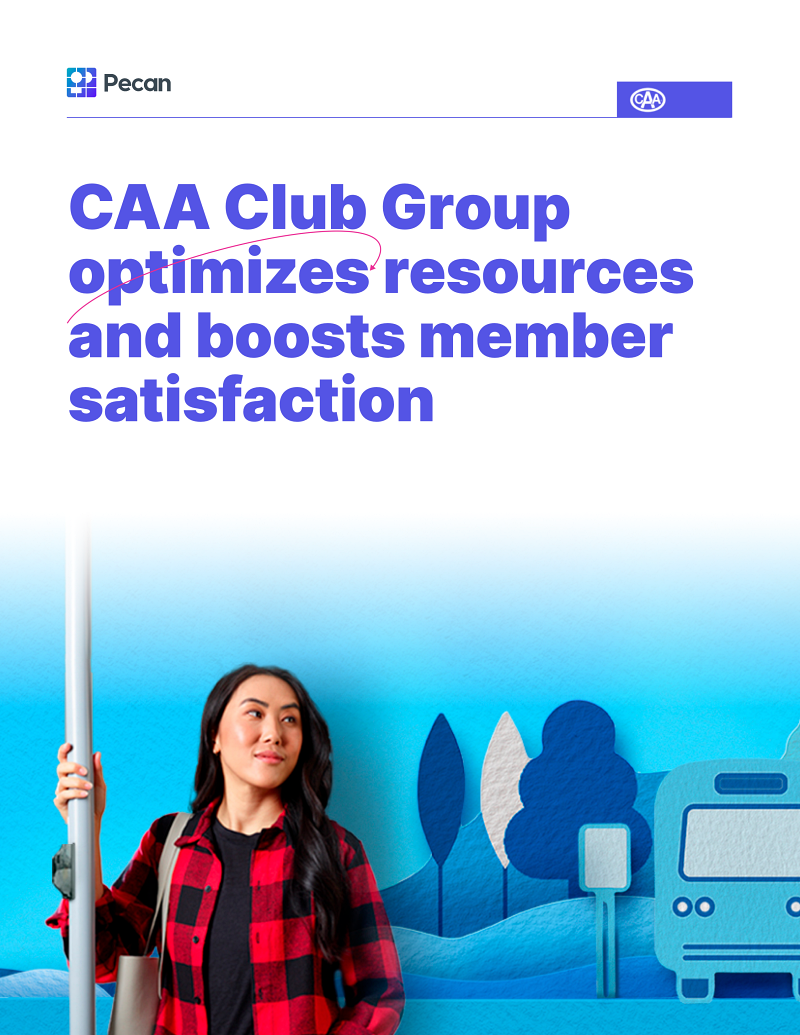It’s happened to every driver. You turn the car key in the ignition … and nothing happens.
Need roadside assistance? If you’re one of the 2.5 million members of CAA Club Group (CCG), you’re in luck. Thanks to accurate, granular forecasts generated with Pecan, CCG is able to optimally schedule their rescue vehicles for the anticipated demand.
Emergency roadside assistance is a major service provided to members of the Canadian Automobile Association (CAA) and the American Automobile Association (AAA). CCG is Canada’s largest not-for-profit automobile club that covers the most populous areas of Ontario, including Toronto, and Manitoba.
The CCG roadside product data science team chose Pecan when they needed a faster, automated solution for optimizing roadside assistance forecasting and staffing. The team uses Pecan to rapidly generate, implement, monitor, and refine dozens of models that predict Member call volume over short- and long-term intervals, as well as for specific regions and for five types of service. Pecan’s predictions are used in their day-to-day operations to better allocate resources and build staff schedules for their driver network.
Challenge
Time-consuming, manually created forecasts didn’t cover the club’s full scope
Prior to using Pecan, one CCG team member created forecasts manually for roadside assistance call volumes. Each set of forecasts required a week of work.
While the manual forecast could cover majority of the club’s region, the format of the Pecan output saved significant time.
CCG sought a scalable solution that would enable it to optimize resource allocation among all CCG facilities, with the goal of improving service for all 2.5M Members.
Furthermore, it was important to find a partner that offered a flexible yet automated approach that could ingest hundreds of millions of rows of data from a variety of data sources, refine models easily based on evolving combinations of variables, and implement top-performing models seamlessly into their workflows.
- Pecan expanded modeling capability without requiring more data science resources
- Pecan’s platform offered easy experimentation, model deployment, and monitoring
- Ability to quickly create highly granular models enables refined forecasts for specific facility locations, times, and service types
Solution
Pecan empowers the roadside product data science team with easy experimentation
With Pecan, the CCG roadside product data science team currently uses a set of 30+ models developed by lead data scientist Debasmita Biswal, a Pecan user since 2020.
Debasmita’s team generates a short-term demand forecast twice per week. The short-term forecasts predict call volume and service type for every hour period in the following week. Forecasts are specific to each of the nearly 600 micro-regions within the club’s coverage area, and are also consolidated by broader regions.
This highly granular forecast is critical for staffing and staging vehicles where they’re most likely to be needed, 24/7 — reducing response times for stranded Members. During intense winter weather, Debasmita can easily run the models daily to factor the changing conditions into their forecasts.
Additionally, Debasmita uses Pecan to retrain and run a capacity planning model once per quarter to generate predictions for call volume a year in advance.
Debasmita has continuously experimented with and improved upon the predictive models using Pecan, creating hundreds of models over time — a fast and nearly effortless process with the platform.
“The platform is very simple and easy to use. To experiment with models, all I have to do is check or uncheck specific variables I want to include in the modeling process,” Debasmita says. “If I need to bring in more data and build more datasets and connections, I can do that easily.”
“For example, in January and February, when the temperature starts dropping, the battery service call volume goes up. There’s a very strong correlation,” Debasmita explains. Using Pecan, she’s easily added variables to improve wintertime model performance.
Equipped with AI-enabled foresight about call volumes, CCG uses business logic to translate predicted call volume into the number of trucks needed at each facility.
- Pecan’s automated model building and monitoring made it possible to build, implement, monitor, and refine dozens of models rapidly
- Forecasts are highly granular, focusing on Member call volume at different time intervals, for specific regions and across five types of service
- Predictions are used to optimize allocation of resources and staff to various locations based on anticipated call volume, preventing waste
Results
Pecan brings rapid outcomes and enables rapid responses for Member satisfaction
Using Pecan has helped CCG develop its AI-based forecasting capabilities to improve service and increase Member satisfaction across the club’s entire region. Moreover, Pecan’s automated modeling means that CCG’s in-house roadside product data science team could create and refine forecasts much more rapidly than with hand-coded models.
A CCG Member stuck with a dead battery, shivering in a Canadian winter, won’t ever know how much effort and state-of-the-art technology has gone into minimizing their rescue’s response time. But they’ll be delighted by the fast assistance when they call for help — and they’ll be even more likely to renew their CCG membership, and to spread the word about the positive experience to friends and family.



